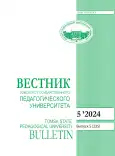Formation and development of the national system of quality assurance in higher education of the Republic of Mauritius
- Authors: Ooriah S.1, Tabishev T.A.1
-
Affiliations:
- Kabardino-Balkarian State University named after H. M. Berbekov
- Issue: No 5 (2024)
- Pages: 108-118
- Section: METHODOLOGY AND TECHNOLOGY OF PROFESSIONAL EDUCATION
- URL: https://journal-vniispk.ru/1609-624X/article/view/267902
- DOI: https://doi.org/10.23951/1609-624X-2024-5-108-118
- ID: 267902
Cite item
Full Text
Abstract
About the authors
Shivanand Ooriah
Kabardino-Balkarian State University named after H. M. Berbekov
Email: mfd555@yandex.ru
Nalchik, Kabardino-Balkarian Republic, Russian Federation
Timur Arsenovich Tabishev
Kabardino-Balkarian State University named after H. M. Berbekov
Email: timur.tabishev@yandex.ru
Nalchik, Kabardino-Balkarian Republic, Russian Federation
References
- Herbst Jeffrey. States and Power in Africa: Comparative Lessons in Authority and Control // Princeton Studies in International History and Politics, Princeton University Press. 2000. 312 p.
- Lord Jack. Child Labor in the Gold Coast: The Economics of Work, Education, and the Family in Late-Colonial African Childhoods, 1940-57 // The Journal of the History of Childhood and Youth. 2011. Vol. 4, Is. 1. P. 88–115.
- Karel Van Der Toorn. Egyptian Papyrus shed light on Jewish History // Biblical Archaeology Review. 2018. Vol. 44, Is. 4. C. 22–33.
- La Langue Française Dans Le Monde. 2015–2018. https://www.francophonie.org/sites/default/files/2021-04/LFDM-20Edition-2019-La-langue-fran%C3%A7aise-dans-le-monde.pdf (дата обращения: 05.11.2023).
- Kamara Mohamed. French Colonial Education and the Making of the Francophone African Bourgeoisie // Dalhousie French Studies. 2005. № 72. P. 105–114.
- Windel Aaron. British Colonial Education in Africa: Policy and Practice in the Era of Trusteeship // History Compass. 2009. Т. 7. № 1. P. 1–21.
- World Bank in Mauritius. March, 2021. URL: https://documents1.worldbank.org/curated/en/566521614947737091/pdf/World-Bank-in-Mauritius.pdf (дата обращения: 05.11.2023).
- Mauritius's Constitution of 1968 with Amendments through 2016. URL: https://www.constituteproject.org/constitution/Mau-ritius_2016.pdf?lang=en (дата обращения: 05.11.2023).
- Education Act 39 of 1957. URL: https://attorneygeneral.govmu.org/Documents/Laws%20of%20Mauritius/A-Z%20Acts/E/Education%20Act,%20No.%2039%20of%201957.pdf (дата обращения: 05.11.2023).
- Степанов М. С. Потенциальные страновые приоритеты экспорта российского образования // Педагогический журнал. 2019. Т. 9, № 5А, ч. I. С. 208–217.
- The Higher Education Act 2017 (QAA, December 2017). URL: https://qaa.ac.mu/pdfdocs/HigherEducationAct2017.pdf (дата обращения: 05.11.2023).
- Guidelines for Quality Assurance of Programmes (QAA, July 2021). URL: https://qaa.ac.mu/pdfdocs/Guidelines_for_Quality_Assurance_of_Programmes.pdf (дата обращения: 05.11.2023).
- Standards and Guidelines for Quality Assurance in the European Higher Education Area. URL: https://www.enqa.eu/wp-content/uploads/2015/11/ESG_2015.pdf (дата обращения: 05.11.2023).
- Байденко В. И., Селезнёва Н. А. Обеспечение качества высшего образования: современный опыт (статья 2) // Высшее образование в России. 2017. № 11 (217). С. 122–136.
- Измайлова М. А., Корнева Е. Ю., Маколов В. И., Салимова Т. А. Механизмы и процедуры обеспечения качества в высшем образовании в контексте реализации европейских подходов // Интеграция образования. 2020. Т. 24, № 3. С. 377–395.
Supplementary files






